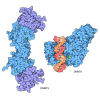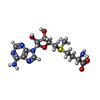[English] 日本語
 Yorodumi
Yorodumi- PDB-9u92: Cryo-EM structure of Tetrahymena DNA methyltransferase complex MTA1c -
+ Open data
Open data
- Basic information
Basic information
| Entry | Database: PDB / ID: 9u92 | ||||||
|---|---|---|---|---|---|---|---|
| Title | Cryo-EM structure of Tetrahymena DNA methyltransferase complex MTA1c | ||||||
 Components Components |
| ||||||
 Keywords Keywords | DNA BINDING PROTEIN / DNA methyltransferase / DNA N6-methyladenine modification / protein-DNA complex / chromatin regulation / gene regulation | ||||||
| Function / homology |  Function and homology information Function and homology informationmRNA m6A methyltransferase / mRNA m(6)A methyltransferase activity / RNA N6-methyladenosine methyltransferase complex / methylation / nucleus / membrane Similarity search - Function | ||||||
| Biological species |  Tetrahymena thermophila SB210 (eukaryote) Tetrahymena thermophila SB210 (eukaryote) | ||||||
| Method | ELECTRON MICROSCOPY / single particle reconstruction / cryo EM / Resolution: 2.68 Å | ||||||
 Authors Authors | Xu, Q. / Shi, Z.B. | ||||||
| Funding support |  China, 1items China, 1items
| ||||||
 Citation Citation |  Journal: Nat Commun / Year: 2025 Journal: Nat Commun / Year: 2025Title: Mechanism for the substrate recognition by a eukaryotic DNA N-adenine methyltransferase complex. Authors: Qi Xu / Ying Xie / Zhubing Shi /  Abstract: In eukaryotes, DNA N-methyladenine (6mA) modification plays important roles in various cellular functions, such as chromatin dynamics, gene expression regulation, and DNA damage response. It remains ...In eukaryotes, DNA N-methyladenine (6mA) modification plays important roles in various cellular functions, such as chromatin dynamics, gene expression regulation, and DNA damage response. It remains largely unknown how eukaryotic DNA 6mA methyltransferases (MTases) recognize their substrates. Here, we reported the structures of DNA-bound eukaryotic 6mA MTase complexes. The MTA1 complex (MTA1c) in ciliates is composed of MTA1, MTA9 (or MTA9-B), p1 and p2 subunits. Cryo-electron microscopy structures of MTA1c-DNA complexes reveal that DNA lies on the surface of the MTA1-MTA9/9-B dimer and is clamped by the p1 N-terminal region. The target deoxyadenosine is flipped out of the DNA duplex and approaches the catalytic center. Unmethylated and hemi-methylated DNA substrates bind MTA1c with differential conformational dynamics. Our structural and biochemical studies shed light on the activation and substrate recognition of MTA1c and provide a framework for understanding the molecular mechanism of DNA 6mA modification in eukaryotes. | ||||||
| History |
|
- Structure visualization
Structure visualization
| Structure viewer | Molecule:  Molmil Molmil Jmol/JSmol Jmol/JSmol |
|---|
- Downloads & links
Downloads & links
- Download
Download
| PDBx/mmCIF format |  9u92.cif.gz 9u92.cif.gz | 163 KB | Display |  PDBx/mmCIF format PDBx/mmCIF format |
|---|---|---|---|---|
| PDB format |  pdb9u92.ent.gz pdb9u92.ent.gz | 115.1 KB | Display |  PDB format PDB format |
| PDBx/mmJSON format |  9u92.json.gz 9u92.json.gz | Tree view |  PDBx/mmJSON format PDBx/mmJSON format | |
| Others |  Other downloads Other downloads |
-Validation report
| Summary document |  9u92_validation.pdf.gz 9u92_validation.pdf.gz | 1.3 MB | Display |  wwPDB validaton report wwPDB validaton report |
|---|---|---|---|---|
| Full document |  9u92_full_validation.pdf.gz 9u92_full_validation.pdf.gz | 1.3 MB | Display | |
| Data in XML |  9u92_validation.xml.gz 9u92_validation.xml.gz | 32.2 KB | Display | |
| Data in CIF |  9u92_validation.cif.gz 9u92_validation.cif.gz | 47.1 KB | Display | |
| Arichive directory |  https://data.pdbj.org/pub/pdb/validation_reports/u9/9u92 https://data.pdbj.org/pub/pdb/validation_reports/u9/9u92 ftp://data.pdbj.org/pub/pdb/validation_reports/u9/9u92 ftp://data.pdbj.org/pub/pdb/validation_reports/u9/9u92 | HTTPS FTP |
-Related structure data
| Related structure data |  63956MC  8xylC  8xypC  8xyqC  8xyxC  9u9eC  9u9kC  9vu6C M: map data used to model this data C: citing same article ( |
|---|---|
| Similar structure data | Similarity search - Function & homology  F&H Search F&H Search |
- Links
Links
- Assembly
Assembly
| Deposited unit | 
|
|---|---|
| 1 |
|
- Components
Components
| #1: Protein | Mass: 43368.852 Da / Num. of mol.: 1 Source method: isolated from a genetically manipulated source Source: (gene. exp.)  Tetrahymena thermophila SB210 (eukaryote) Tetrahymena thermophila SB210 (eukaryote)Gene: TTHERM_00704040 / Production host:  |
|---|---|
| #2: Protein | Mass: 55576.137 Da / Num. of mol.: 1 Source method: isolated from a genetically manipulated source Source: (gene. exp.)  Tetrahymena thermophila SB210 (eukaryote) Tetrahymena thermophila SB210 (eukaryote)Gene: TTHERM_00301770 / Production host:  |
| #3: Protein | Mass: 41937.090 Da / Num. of mol.: 1 Source method: isolated from a genetically manipulated source Source: (gene. exp.)  Tetrahymena thermophila SB210 (eukaryote) Tetrahymena thermophila SB210 (eukaryote)Gene: TTHERM_00161750 / Production host:  |
| #4: Protein | Mass: 17043.350 Da / Num. of mol.: 1 Source method: isolated from a genetically manipulated source Source: (gene. exp.)  Tetrahymena thermophila SB210 (eukaryote) Tetrahymena thermophila SB210 (eukaryote)Gene: TTHERM_00439330 / Production host:  |
| #5: Chemical | ChemComp-SAM / |
| Has ligand of interest | Y |
| Has protein modification | N |
-Experimental details
-Experiment
| Experiment | Method: ELECTRON MICROSCOPY |
|---|---|
| EM experiment | Aggregation state: PARTICLE / 3D reconstruction method: single particle reconstruction |
- Sample preparation
Sample preparation
| Component | Name: Tetrahymena MTA1c with SAM / Type: COMPLEX / Entity ID: #1-#4 / Source: RECOMBINANT |
|---|---|
| Molecular weight | Experimental value: NO |
| Source (natural) | Organism:  Tetrahymena thermophila SB210 (eukaryote) Tetrahymena thermophila SB210 (eukaryote) |
| Source (recombinant) | Organism:  |
| Buffer solution | pH: 7.5 Details: 20 mM HEPES pH 7.5, 50 mM K glutamate, 0.5 mM TCEP, 0.025% beta-OG |
| Specimen | Conc.: 0.4 mg/ml / Embedding applied: NO / Shadowing applied: NO / Staining applied: NO / Vitrification applied: YES |
| Specimen support | Grid material: GOLD / Grid mesh size: 400 divisions/in. / Grid type: Quantifoil R1.2/1.3 |
| Vitrification | Cryogen name: ETHANE / Humidity: 100 % / Chamber temperature: 277 K |
- Electron microscopy imaging
Electron microscopy imaging
| Experimental equipment |  Model: Titan Krios / Image courtesy: FEI Company |
|---|---|
| Microscopy | Model: TFS KRIOS |
| Electron gun | Electron source:  FIELD EMISSION GUN / Accelerating voltage: 300 kV / Illumination mode: FLOOD BEAM FIELD EMISSION GUN / Accelerating voltage: 300 kV / Illumination mode: FLOOD BEAM |
| Electron lens | Mode: BRIGHT FIELD / Nominal magnification: 130000 X / Nominal defocus max: 2000 nm / Nominal defocus min: 1000 nm / Cs: 2.7 mm / C2 aperture diameter: 50 µm |
| Specimen holder | Specimen holder model: FEI TITAN KRIOS AUTOGRID HOLDER |
| Image recording | Electron dose: 50 e/Å2 / Film or detector model: FEI FALCON IV (4k x 4k) / Num. of real images: 11231 |
| EM imaging optics | Energyfilter name: TFS Selectris X / Energyfilter slit width: 10 eV |
- Processing
Processing
| EM software |
| ||||||||||||||||||||||||||||||||||||||||
|---|---|---|---|---|---|---|---|---|---|---|---|---|---|---|---|---|---|---|---|---|---|---|---|---|---|---|---|---|---|---|---|---|---|---|---|---|---|---|---|---|---|
| CTF correction | Type: NONE | ||||||||||||||||||||||||||||||||||||||||
| Symmetry | Point symmetry: C1 (asymmetric) | ||||||||||||||||||||||||||||||||||||||||
| 3D reconstruction | Resolution: 2.68 Å / Resolution method: FSC 0.143 CUT-OFF / Num. of particles: 519573 / Algorithm: FOURIER SPACE / Num. of class averages: 1 / Symmetry type: POINT | ||||||||||||||||||||||||||||||||||||||||
| Atomic model building | Protocol: RIGID BODY FIT / Space: REAL | ||||||||||||||||||||||||||||||||||||||||
| Atomic model building | Source name: AlphaFold / Type: in silico model | ||||||||||||||||||||||||||||||||||||||||
| Refinement | Cross valid method: NONE | ||||||||||||||||||||||||||||||||||||||||
| Refine LS restraints |
|
 Movie
Movie Controller
Controller












 PDBj
PDBj



